|
|
|
Sort Order |
|
|
|
Items / Page
|
|
|
|
|
|
|
| Srl | Item |
| 1 |
ID:
127058
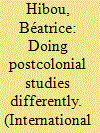

|
|
|
|
|
| Publication |
2013.
|
| Summary/Abstract |
Mohamed Tozy is certainly one of the better known Moroccan intellectuals in the Arab world and in Europe, in particular for his publication of the book Monarchie et islam politique au Maroc (Monarchy and Political Islam in Morocco) which is a classic in social sciences and political studies.2 He is a Professor at the Institute of Political Science (Institut d'Etudes Politiques, IEP) in Aix-en-Provence and at the Hassan II University in Casablanca and also a researcher at LAMES (LAboratoire MEditerranéen de Sociologie) of the Maison Méditerranéenne de Sciences Humaines d'Aix-Marseille as well as at CHERPA (Croyance, Histoire, Espace, Régulation Politique et Administrative). In 2005, he set up the Centre Marocain des Sciences Sociales (CM2S), which is the first one of its kind in social sciences in Morocco to have included a doctoral school. He is presently in the process of setting up a faculty for social sciences at the Mohamed VI polytechnic University
|
|
|
|
|
|
|
|
|
|
|
|
|
|
|
|
| 2 |
ID:
127055
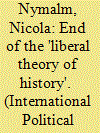

|
|
|
|
|
| Publication |
2013.
|
| Summary/Abstract |
Over the last 10 years, economic issues related to currency policy have become the major ongoing dispute between China and the United States. Specifically, the US Congress has demanded a tougher policy to avert the negative consequences of "unfair" Chinese policies-in the form of a "manipulated currency"-for the US economy. Building on an analytical framework of discourse theory (DT)-and proposing a method for applying DT in empirical research-an investigation into congressional debates on the Chinese currency shows that the question is not a purely economic one, but rather that it reflects a dislocation of US identity as the vanguard of liberal-democratic capitalism. This dislocation involves changes to how "liberal" identity in the US Congress is articulated in relation to the role attributed to "illiberal" China, which in turn affects the formulation of US China policy in Congress.
|
|
|
|
|
|
|
|
|
|
|
|
|
|
|
|
| 3 |
ID:
127053
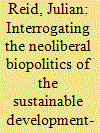

|
|
|
|
|
| Publication |
2013.
|
| Summary/Abstract |
One of the defining features of post-Cold War international relations has been the correlation of development practices and rationalities with those of security, and the emergence of what has been called the "development-security nexus." While the development-security nexus remains relevant, semantic shifts in the conceptualization of both development and security are occurring. Demands for development are increasingly tied not simply to demands for "security," but to a discursively new object of "resilience." And this shift from security to resilience is likewise tied to a reconceptualization of development as "sustainable development." Are these, then, merely semantic shifts, or do they signify changes in the rationalities that have shaped the "development-security nexus" during the post-Cold War period? Are the rationalities that distinguish resilience different to those underpinning demands for security? And are those of "sustainable development" different to what was once known simply as "development"? Does the weaving of a nexus of relations between "sustainable development" and "resilience" represent a departure from the "development-security nexus" in some way? And, if so, what explains that shift and what are its political implications? This article answers these questions through an analysis of the neoliberal biopolitics of the "sustainable development-resilience nexus." While sustainable development deploys ecological reason to argue for the need to secure the life of the biosphere, neoliberalism prescribes economy as the very means of that security. Economic reason is conceived within neoliberalism as a servant of ecological reason, claiming to secure life from economy through a promotion of the capacities of life for economy. This is the paradoxical foundation on which neoliberalism constructs its appropriation of sustainable development. Sustainable development and neoliberalism are not the same, nor is the former simply a proxy of the latter, but they do come into contact powerfully on the terrain of their rationalities of security which, on account of the interplay between ecological and economic reason, is increasingly conceptualized as resilience. This surface of contact ought to make for a tense and political field of contestation, but has instead made largely for a strategically manipulable relation between the two doctrines.
|
|
|
|
|
|
|
|
|
|
|
|
|
|
|
|
| 4 |
ID:
127056
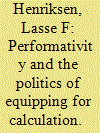

|
|
|
|
|
| Publication |
2013.
|
| Summary/Abstract |
This article argues that the concept of performativity deepens our understanding of contemporary, expertise-driven processes of global economic governance. Tracing the World Bank's role in constructing a global market for microfinance, the paper suggests that the World Bank was instrumental in translating selected parts of economic models into practice, thereby changing microfinance practices globally. Socio-technical networks centered on the World Bank were created to equip actors to become part of a global market, which incorporated not only donors but also commercial investors. The paper makes a critical intervention in the performativity literature by arguing for the need to take positional power and dominance in the socio-technical networks of International Organizations more seriously. This move improves our ability to specify how economic ideas and models are translated into practice in transnational arenas.
|
|
|
|
|
|
|
|
|
|
|
|
|
|
|
|
| 5 |
ID:
127054
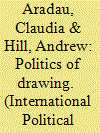

|
|
|
|
|
| Publication |
2013.
|
| Summary/Abstract |
Drawing has been largely neglected in discussions of visuality, conflict, and violence. In 2007, the International Criminal Court accepted 500 children's drawings depicting the conflict in Darfur as contextual evidence for war crime trials against Sudanese officials. Starting from this event, and the attention that the Darfuri children's drawings have garnered internationally, this article explores the role that drawings, and children's drawings in particular, play in the visualization of conflict and violence. Rather than focusing primarily on the relation between image and text, the article argues that visuality needs to be understood as both an aesthetic and social object, whose production, circulation, and reception transform its political effects. It then shows how children's drawings are both differentially produced, and productive of difference and ambivalence, in the "truthfulness" of conflict.
|
|
|
|
|
|
|
|
|
|
|
|
|
|
|
|
| 6 |
ID:
127057


|
|
|
|
|
| Publication |
2013.
|
| Summary/Abstract |
This study draws upon the insights of Michel Foucault to examine the contemporary immigration industrial complex in the United States. We focus on the involvement of private prison corporations in this complex, as well as the factors that have been essential to its creation and that perpetuate its continuance. We argue that four key aspects of the system (the legal apparatus, worldviews/ideas, private corporations, and webs of influence) converge to create an immigration industrial complex and that this complex functions as an economy of power that works to manage the existing system and discourages fundamental reform.
|
|
|
|
|
|
|
|
|
|
|
|
|
|
|
|
|
|
|
|
|